April 23, 2025:
SIOUX FALLS, S.D. (AP) — The massive carbon capture pipeline in the Midwest was thrown into uncertainty Tuesday (April 22, 2025) after South Dakota’s Public Utility Commission denied its route permit application.
The commission voted 2-1 to deny the application by Iowa-based Summit Carbon Solutions, with Commissioner Kristie Fiegen saying it was “not ready to go forward” and lacked “the form and content required.”
“The PUC’s duty is to make a decision based on a route — one route,” said Fiegen, who initiated the motion to deny. “The current route, in my view, is not viable.”
South Dakota lawmakers passed an eminent domain ban for carbon capture pipelines in March that made Summit’s planned route difficult, commissioners agreed. After Tuesday’s decision, Summit said it will refile its application with a reduced route in South Dakota to satisfy landowners and ethanol plant partners.
“While we are disappointed in today’s decision, we remain committed to South Dakota as without it the ethanol industry, farmers, and land values in the state will all suffer,” the company said in a statement.
South Dakota is a crucial part of the 2,500-mile pipeline, estimated to cost $8.9 billion. The pipeline would transport carbon emissions from ethanol plants in Iowa, Minnesota, Nebraska, North Dakota and South Dakota to be stored underground permanently in North Dakota. The project already has approvals in Iowa, Minnesota and North Dakota, and Summit has invested more than $150 million into its route in South Dakota.
Landowners rejoiced over the Tuesday decision.
“Today is a victory for South Dakota landowners and local control,” Dakota Rural Action board member Ed Fischbach said in a statement. “We are grateful the PUC has made this common sense decision and freed landowners to get on with their lives and businesses.”
Summit had previously requested a timeline extension on its permit application to rework its route in a way that would satisfy landowners.
Questions about the pipeline arose after South Dakota lawmakers approved a ban on eminent domain for carbon capture projects, in which the government can seize private property with compensation. Without that power, Summit would need to secure voluntary agreements with landowners along the South Dakota route.
In its filing for an extension, Summit said it would work with landowners and the state in “good faith” rather than challenge the eminent domain ban. That statement convinced commissioners that there was no path forward for Summit given the amount of landowner opposition along the current route.
Instead of pursuing legal action against the state, Summit said in its filing that additional time would allow it to “roll out new offers to landowners” and identify which branches to ethanol plants it can eliminate that face significant landowner opposition.
The ethanol industry is concentrated in the Midwest, with nearly 40% of the nation’s corn used to brew ethanol. By sequestering carbon in North Dakota, Summit’s pipeline promises to lower the carbon intensity of ethanol and make it more competitive as a sustainable product.
April 22, 2025, update:
SIOUX FALLS, S.D. (AP) — The massive carbon capture pipeline in the Midwest has been thrown into uncertainty after South Dakota’s Public Utility Commission denied its route permit application Tuesday (April 22, 2025).
The commission voted 2-1 to deny the application by Iowa-based Summit Carbon Solutions, with Commissioner Kristie Fiegen saying it was “incomplete” and lacked “the form and content required.”
South Dakota lawmakers passed an eminent domain ban for carbon capture pipelines in March that makes Summit’s planned route difficult, commissioners agreed. Summit said it will refile its application with a reduced route in South Dakota to satisfy landowners and plant partners.
“While we are disappointed in today’s decision, we remain committed to South Dakota as without it the ethanol industry, farmers, and land values in the state will all suffer,” the company said in a statement.
South Dakota is a crucial part of the 2,500-mile pipeline, which would transport carbon emissions from ethanol plants in Iowa, Minnesota, Nebraska, North Dakota and South Dakota to be stored underground permanently in North Dakota.
April 22, 2025:
SIOUX FALLS, S.D. (AP) — The company behind a planned $8.9 billion carbon capture pipeline in the Midwest has proposed reducing its route through South Dakota to secure the necessary permitting.
In a filing with the South Dakota Public Utilities Commission on Friday, Iowa-based Summit Carbon Solutions requested a timeline extension on its permit application to rework its route in a way that would satisfy landowners. The commission is expected to decide on this extension request during its meeting Tuesday afternoon (April 22, 2025).
Questions about the pipeline arose after South Dakota lawmakers approved a ban on eminent domain for carbon capture projects, in which the government can seize private property with compensation. Without that power, Summit would need to secure voluntary agreements with landowners along the South Dakota route.
Instead of pursuing legal action against the state, Summit said in its filing that additional time would allow it to “roll out new offers to landowners” and identify which branches to ethanol plants it can eliminate that face significant landowner opposition.
“The Applicant believes threatening legal action is counter-productive to attempting to do good-faith business with the state,” Summit attorney Brett Koenecke wrote in the filing. “Instead, the Applicant intends to make significant efforts and undertake several tasks in the coming weeks and months to advance the project and prepare to proceed with a new scheduling order.”
South Dakota is a crucial part of the 2,500-mile pipeline, which would carry carbon emissions from ethanol plants in Iowa, Minnesota, Nebraska, North Dakota and South Dakota to be stored underground permanently in North Dakota. The project already has approvals in Iowa, Minnesota and North Dakota, and Summit has invested more than $150 million into its route in South Dakota.
The ethanol industry is concentrated in the Midwest, with nearly 40% of the nation’s corn used to brew ethanol. Summit’s pipeline promises to lower the carbon intensity of ethanol to make it more competitive as a sustainable product.
April 9, 2025:
Summit Carbon Solutions is on the agenda for the South Dakota Public Utilities Commission when they meet this week (April 10, 2025), but this time the company is asking state regulators to “suspend current scheduling order and extend current deadline indefinitely.”
Three different motions related to the case were filed last month.
-
March 12, 2025, Summit filed a Motion to Suspend Current Scheduling Order and Extend Current Deadline Indefinitely.
-
March 27, 2025, Attorney Brian Jorde filed a Motion to Deny Application on behalf of certain Intervenors in the case.
-
March 31, 2025, Intervenor Spink County filed Spink County Commission’s Motion for Attorney’s Fees.
In each instance, the PUC issued a Notice of Hearing, putting the three requests on the agenda for their Thursday (April 10, 2025) meeting in Room 413 of the South Dakota State Capitol Building in Pierre. The meeting begins at 1:30pm CT, with the Summit Carbon Solutions-related items scheduled to be heard at 2:30pm CT, or at the conclusion of the other agenda items, whichever is later.
In November 2024 (Nov. 19, 2024), Summit Carbon Solutions submitted an application to the PUC for a Permit to Construct the Midwest Carbon Express pipeline. This project is approximately 2,500 miles of pipelines for the transportation of CO2 from ethanol plants across five states to underground injection wells in North Dakota. The South Dakota portion of the pipeline, is approximately 698 miles, crossing 23 counties.
DECEMBER 12, 2024, UPDATE:
“These sequestration permits are the result of years of rigorous scientific study, engineering design, and input from regulators, landowners, and local leaders,” said Wade Boeshans, Executive VP of Summit Carbon Solutions in a company statement on Thursday. “This milestone underscores North Dakota’s leadership in advancing CCS technology and highlights how infrastructure projects like ours can drive economic growth while enabling energy innovation. With these permits, we’re one step closer to providing vital infrastructure that benefits farmers, ethanol producers, and communities across the Midwest.”
The permits allow Summit Carbon Solutions to permanently store more than 350 million metric tons of CO₂ in geologic formations more than a mile underground. This process ensures long-term safety while decarbonizing 57 ethanol plants across five states.
American Carbon Alliance CEO Tom Buis, in a statement, said “The ACA commends the North Dakota Public Service Commission’s decision to approve Summit Carbon Solutions’ plans for carbon sequestration in North Dakota. This decision highlights North Dakota’s leadership in advancing innovative solutions that enhance energy security, support farmers’ profitability, create jobs in rural communities, and contribute to the development of next-generation biofuels through carbon management.”
Also last week (Dec. 12, 2024), the Minnesota Public Utilities Commission approved the company’s pipeline route permit for 28 miles of pipeline through Otter Tail and Wilkin counties. That follows recent route permit approvals in Iowa, North Dakota and a refiling for a route permit in South Dakota. Summit Carbon Solutions says they are on track to begin construction in early 2026 and operations in 2027.
Story courtesy of Farm and Ranch Media (FARM) partners American Ag Network, Agriculture of America and Market Talk.
Reactions to the North Dakota permit approval:
American Carbon Alliance CEO Tom Buis: “The ACA commends the North Dakota Public Service Commission’s decision to approve Summit Carbon Solutions’ plans for carbon sequestration in North Dakota. This decision highlights North Dakota’s leadership in advancing innovative solutions that enhance energy security, support farmers’ profitability, create jobs in rural communities, and contribute to the development of next-generation biofuels through carbon management.”
Reactions to the Minnesota permit approval:
American Carbon Alliance CEO Tom Buis: “With today’s announcement (Dec. 12, 2024), the Minnesota Utilities Commission has prioritized the advancement of projects that contribute to both environmental stewardship and economic growth. By supporting initiatives like the Summit Pipeline, we can position Minnesota, and the Midwest, as a leader in responsible energy practices, strengthen America’s energy independence, and boost farmers’ profitability.”
DECEMBER 12, 2024:
BISMARCK, N.D. (AP) — A North Dakota panel will consider Thursday (Dec. 12, 2024) whether to approve permits for underground storage of hundreds of millions of metric tons of carbon dioxide that a proposed pipeline would carry from ethanol plants throughout the Midwest.
Approval from the governor-led, three-member Industrial Commission would be another victory for Summit Carbon Solutions’ controversial project, though further court challenges are likely. Last month, the company gained approval for its North Dakota route, and Iowa regulators also have given conditional approval.
Also on Thursday, Minnesota utility regulators approved a permit for a 28-mile leg of the project of the project in western Minnesota.
Summit’s 2,500-mile, $8 billion pipeline would transport planet-warming CO2 emissions from 57 ethanol plants in North Dakota, South Dakota, Iowa, Minnesota and Nebraska for underground storage in central North Dakota.
North Dakota Republican Gov. Doug Burgum chairs the Industrial Commission, which includes the state attorney general and agriculture commissioner and oversees a variety of energy topics and state-owned enterprises.
Burgum is President-elect Donald Trump’s choice for Interior Secretary and to lead a new National Energy Council. Burgum supports Summit’s project and has frequently touted North Dakota’s underground carbon dioxide storage as a “geologic jackpot.” In 2021, he set a goal for the No. 3 oil-producing state to be carbon-neutral by 2030. His term ends Saturday.
Summit applied for permits for three storage facilities, which would hold a combined, estimated maximum of 352 million metric tons of CO2 over 20 years. The pipeline would carry up to 18 million metric tons of CO2 per year to be injected about 1 mile (1.6 kilometers) underground, according to an application fact sheet.
Summit’s documents detail a well site layout encompassing a pump/meter building, gas detection stations, inlet valves and emergency shutoff valve.
Carbon dioxide would move through the pipeline in a pressurized form to be injected deep underground into a rock formation.
Jessie Stolark, who leads a group that includes Summit and supports the project, said the oil industry has long used similar technology.
“We know that this can be done safely in a manner that is protective of human health and underground sources of drinking water,” said Stolark, executive director of the Carbon Capture Coalition.
Summit’s project has drawn the ire of landowners around the region. They oppose the potential taking of their property for the pipeline and fear a pipe rupture releasing a cloud of heavy, hazardous gas over the land.
A North Dakota landowners group is challenging a property rights law related to the underground storage, and attorney Derrick Braaten said they likely would challenge the granting of permits for the storage plans.
“The landowners that I’m working with aren’t necessarily opposed to carbon sequestration itself,” Braaten said. “They’re opposed to the idea that a private company can come in and use their property without having to negotiate with them or pay them just compensation for taking their private property and using it.”
Carbon capture projects such as Summit’s are eligible for lucrative federal tax credits intended to encourage cleaner-burning ethanol and potentially result in corn-based ethanol being refined into jet fuel.
Some opponents argue the amount of greenhouse gases sequestered through the process would make little difference and could lead farmers to grow more corn despite environmental concerns about the crop.
In Minnesota, regulators on Thursday granted a route permit for a small part of the overall project, a 28-mile (45-kilometer) segment that would connect an ethanol plant in Fergus Falls to Summit’s broader network. They attached several conditions, however, including requirements that Summit show that is has obtained all necessary permits in North Dakota and begun construction there before it starts in Minnesota.
An administrative law judge who conducted hearings recommended in November that the Public Utilities Commission grant the permit, saying the panel lacked the legal authority to reject it. The judge concluded that the environmental impacts from the Minnesota segment would be minimal, that the environmental review met the legal requirements, and noted that Summit has secured agreements from landowners along most of the recommended route. Commission staff, the state Department of Commerce and Summit largely concurred with those findings.
Environmental groups that oppose the project disputed the judge’s finding that the project would have a net benefit for the environment.
In addition to North Dakota, Summit has a permit from Iowa for its route, but regulators for that state required the company to obtain approvals for routes in the Dakotas and underground storage in North Dakota before it can begin construction. The Iowa Utilities Commission’s approval sparked lawsuits related to the project.
Last year, South Dakota regulators rejected Summit’s application. The company submitted another permit application last month.
In Nebraska, where there is no state regulatory process for CO2 pipelines, Summit is working with individual counties to advance its project. At least one county has denied a permit.
NOVEMBER 15, 2024:
BISMARCK, N.D. (AP) — North Dakota utility regulators granted approval on Friday (Nov. 15, 2024) for a span of a proposed carbon dioxide pipeline that would cross five Midwestern states — a key victory for the company that has faced vociferous landowner objections and various hurdles and setbacks in its plans.
The state Public Service Commission voted unanimously to approve a siting permit for Summit Carbon Solutions’ modified, 333-mile route in North Dakota. The company’s proposed $8 billion, 2,500-mile pipeline system would carry tons of planet-warming CO2 emissions from 57 ethanol plants in five states for storage deep underground in North Dakota.
No construction has begun anywhere on Summit’s proposed route. Iowa has approved the project, but other hurdles remain in North Dakota as well as South Dakota, Minnesota and Nebraska.
The approval is a win for the company after North Dakota initially denied a permit in 2023, shortly followed by rejection in South Dakota. Another company, Navigator CO2 Ventures, canceled its project around the same time due to the “unpredictable nature of the regulatory and government processes involved, particularly in South Dakota and Iowa.”
Supporters cheer carbon capture projects as a way to combat climate change, with lucrative federal tax credits available for such efforts. The ethanol industry sees Summit’s project opening up sustainable aviation fuel markets, a boost for ethanol and No. 1 corn producer Iowa.
North Dakota Gov. Doug Burgum, now President-elect Donald Trump’s choice for Interior Secretary, a position with wide influence over natural resources, has touted his state’s underground CO2 storage potential as a “geologic jackpot.” Carbon-capture skeptics say the technology is untested at scale and allows the fossil-fuel industry to continue largely unchanged.
Summit opponents, including many landowners across the Midwest, decry the potential of a pipe rupture releasing hazardous, heavy CO2 gas to flow over the land, endangering people’s health and lives. They also fear the taking of their land through eminent domain.
North Dakota Public Service Commission Chairman Randy Christmann urged Summit not to use eminent domain, “at least not more than absolutely necessary.” Eminent domain is not in the panel’s jurisdiction or a part of the siting process, he said.
Summit CEO Lee Blank told reporters the company is pleased with the panel’s decision. He said Summit has worked with landowners on a voluntary basis and will continue to do so.
“Our goal is, again, to acquire as much right of way possible as we can voluntarily, and ultimately at the end of the day, we hope to do 100% of that,” Blank said.
Summit said Friday it has acquired easements for over 82% of its North Dakota route.
Republican state Sen. Jeff Magrum, an opponent whose district the pipeline would cross, said he’d rather see investments in roads, bridges and dams instead of “Green New Deal projects that don’t create any benefit for our state or our country.” He expects the panel’s decision to be challenged.
In a statement, landowner attorney Brian Jorde said, “No surprise on the decision. We need to analyze the written decision. Like in Iowa, the courts will sort this out and ultimately decide if the PSC decision will stand or be reversed.”
In August, the Iowa Utilities Commission issued Summit a hazardous liquid pipeline permit after approving the company’s application in June. The panel also granted Summit the right of eminent domain over numerous parcels of land.
But the company cannot start construction in Iowa until it has route approvals from both Dakotas and approval for underground storage in North Dakota, among other requirements. The Iowa panel’s decision sparked lawsuits in opposition.
Christmann said the North Dakota permit has no restrictions based on what any other states do.
The North Dakota panel had denied Summit a siting permit in August 2023. The regulators said Summit hadn’t sufficiently addressed several issues, including geologic instability, wildlife areas, cultural resource impacts and some landowner concerns.
Soon afterward, the panel agreed to reconsider, beginning more than a year of meetings and document filings.
Summit submitted three storage facility permit applications to North Dakota’s Department of Mineral Resources, but no decision has been made.
In 2022, Minnkota Power Cooperative and Summit agreed to collaborate on developing CO2 storage in central North Dakota, a pact that also lets Summit use Minnkota’s previously permitted 100-million-ton underground storage.
In September 2023, South Dakota’s Public Utilities Commission denied Summit’s permit application after commission staff said the route would violate county ordinances for setback distances. Summit has said it plans to reapply this month for a permit.
In a referendum earlier this month, South Dakota voters rejected a suite of regulations that opponents said would deny local control over such projects and consolidate authority with state regulators. Supporters had promoted it as a “landowner bill of rights.”
The Minnesota Public Utilities Commission is expected to decide Dec. 12 whether to approve a 28-mile segment of pipeline that would connect an ethanol plant near Fergus Falls to Summit’s network in North Dakota. An administrative law judge recommended that the commissioners find that the environmental review for the Minnesota section met the legal requirements, and issue a route permit to Summit.
In Nebraska, where there is no state regulatory process for CO2 pipelines, Summit is working with individual counties to advance its project. At least one county has denied a permit.
JANUARY 28, 2023:
UNDATED (AP)- North Dakota landowners testified for and against a carbon capture company’s use of eminent domain. Some landowners said carbon companies should not be able to forcibly buy people’s land. Other landowners said carbon companies should be able to so they can complete pipeline construction quickly and serve an important public interest. Summit Carbon Solutions’ $4.5 billion proposed pipeline would reduce the state’s carbon footprint and allow North Dakotans to continue working in energy and agriculture. The massive underground system of carbon dioxide pipelines would span 2,000 miles across several states, running under hundreds of people’s homes and farms in the Midwest.
Extended version:
OCTOBER 2022:
Officials with Summit Carbon Solutions and the Ringneck Energy ethanol plant at Onida invited media, legislators and various other folks to take a tour yesterday (Oct. 4, 2022) in an effort to provide more information about the carbon capture pipeline Summit is proposing to build.
Summit’s storage project would connect 32 ethanol biorefineries across five states in the upper Midwest – Iowa, Minnesota, Nebraska, South Dakota and North Dakota. Ringneck is one of the plants that have signed on to the project.
Walt Wendland is the President, CEO and Chairman of the Board of Ringneck Energy. He says allowing the carbon emitted by the plant to be captured will make an efficient plant even more environmentally friendly.
Wendland says low carbon fuel is becoming a requirement in some parts of the country– and world.
Summit Chief Executive Officer Lee Blank says Ringneck Energy and the 31 other plants that have agreed to participate play a “very important role to the partnership.”
Blank says the ground in North Dakota makes it an idea place to store carbon.
Blank says Summit’s proposed project will cut the carbon footprint of partner ethanol plants in half, which will help ensure the long term environmental and economic sustainability of the facilities. Blank says so far, 45% of the landowners along their proposed route have voluntarily agreed to easements.
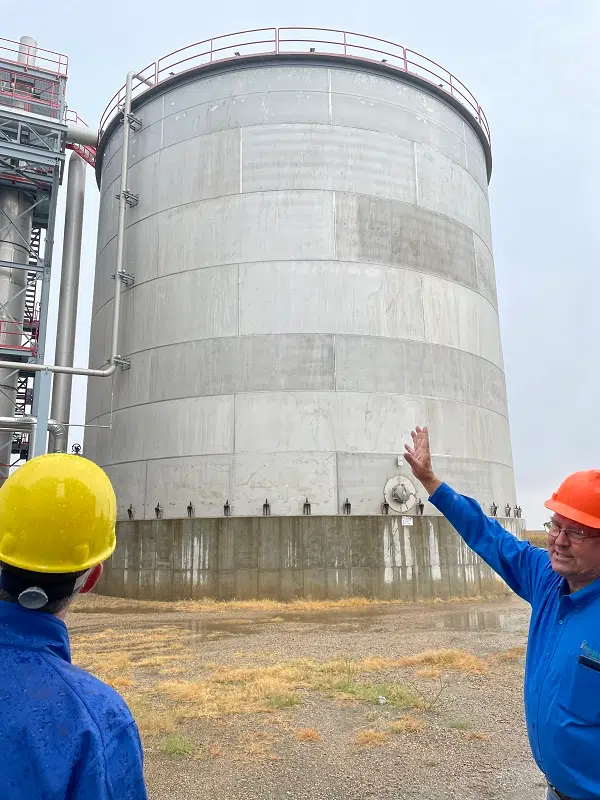
Ringneck Energy CEO and Chairman of the Board Walt Wendland pointing up to where the carbon capture pipeline would connect to the ethanol plant.
Photo credit DRG Media Group.
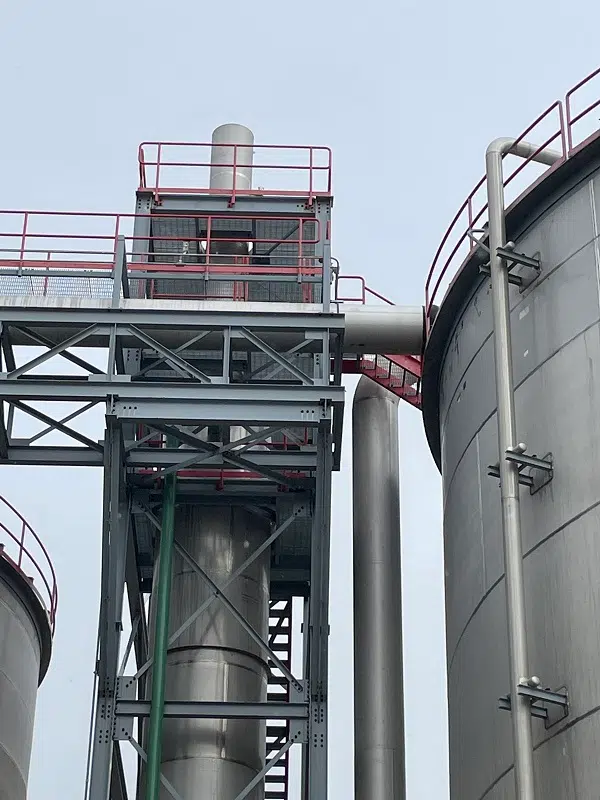
Where the carbon capture pipeline would connect to the ethanol plant.
Photo credit DRG Media Group.
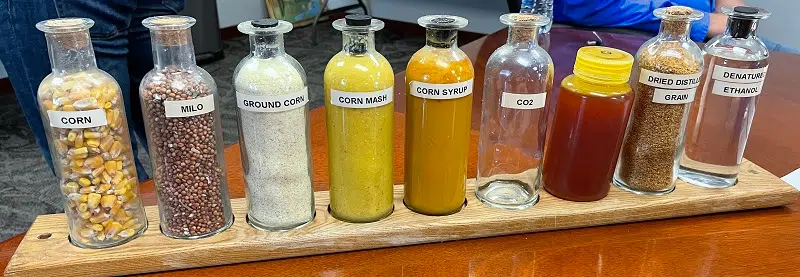
Products used to make ethanol and products made during the ethanol making process.
Photo credit DRG Media Group.
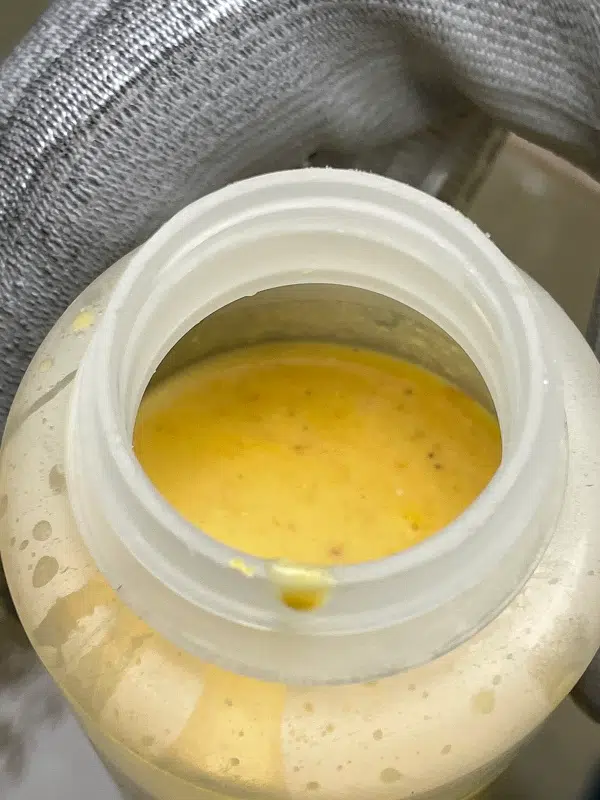
One of the products made during the ethanol making process.
Photo credit DRG Media Group.
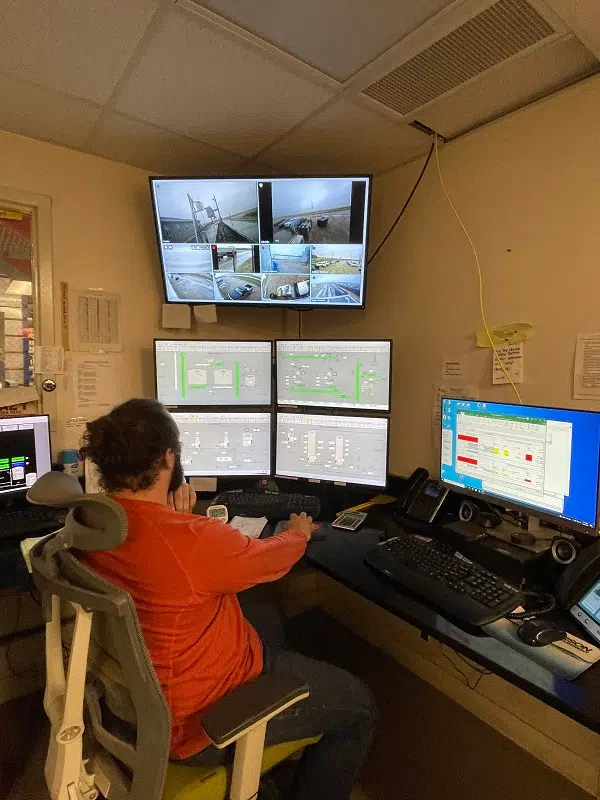
Ringneck Energy ethanol plant control room.
Photo credit DRG Media Group.
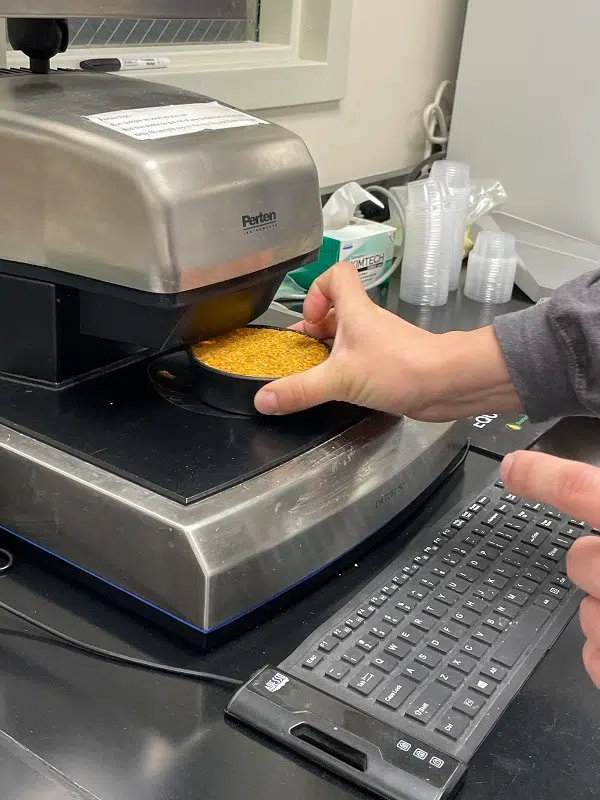
Ringneck Energy lab where they are able to test the nutrient content of distillers grains.
Photo credit DRG Media Group.
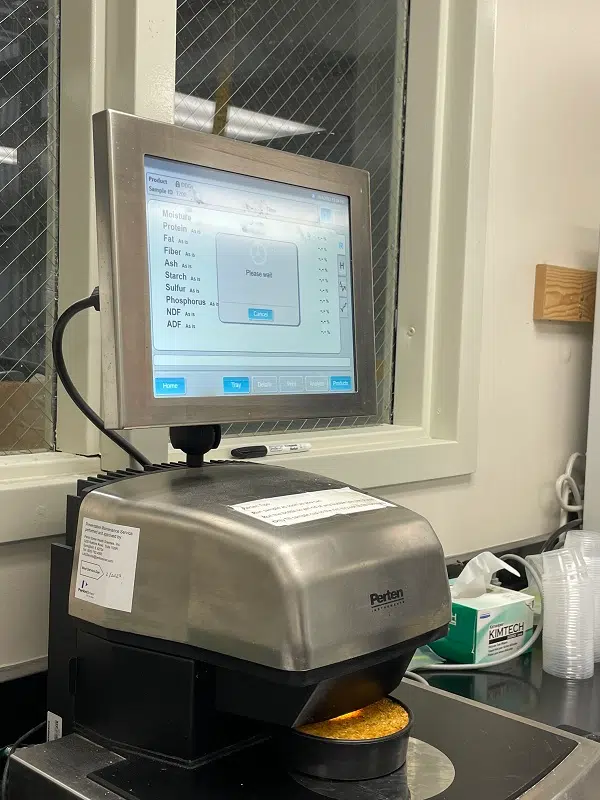
Ringneck Energy lab where they are able to test the nutrient content of distillers grains.
Photo credit DRG Media Group.
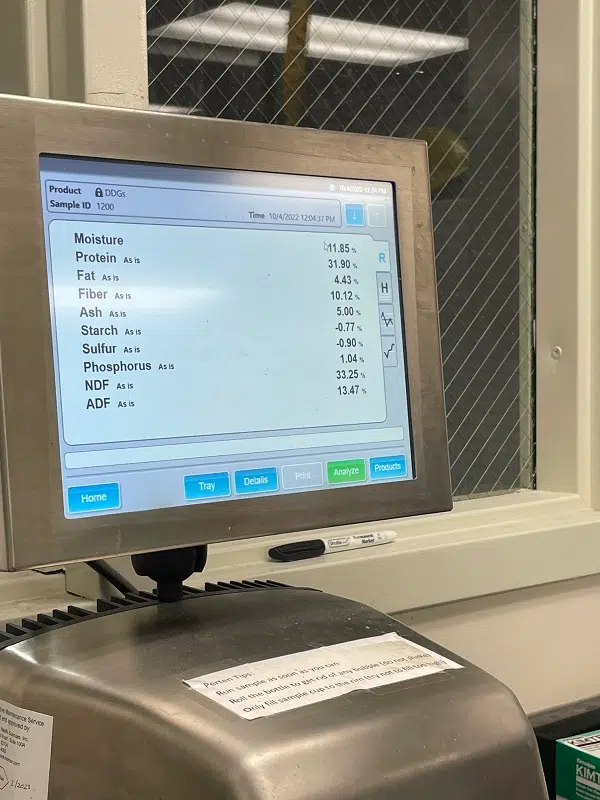
Ringneck Energy lab where they are able to test the nutrient content of distillers grains.
Photo credit DRG Media Group.
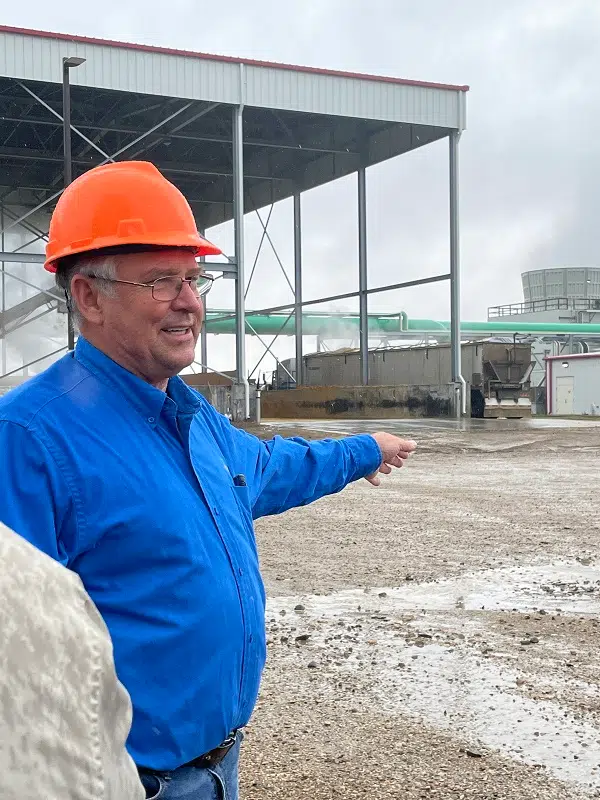
Ringneck Energy CEO and Chairman of the Board Walt Wendland.
Photo credit DRG Media Group.
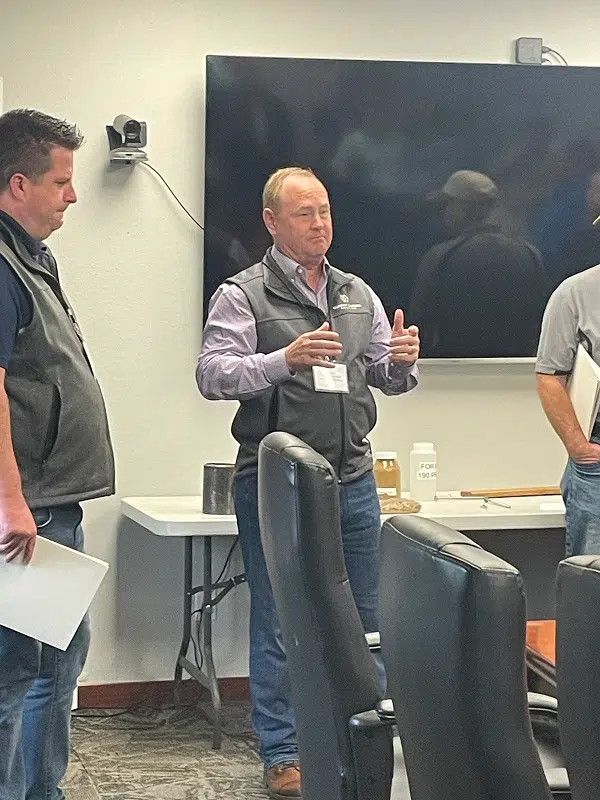
Summit Carbon Solutions CEO Lee Blank.
Photo credit DRG Media Group.
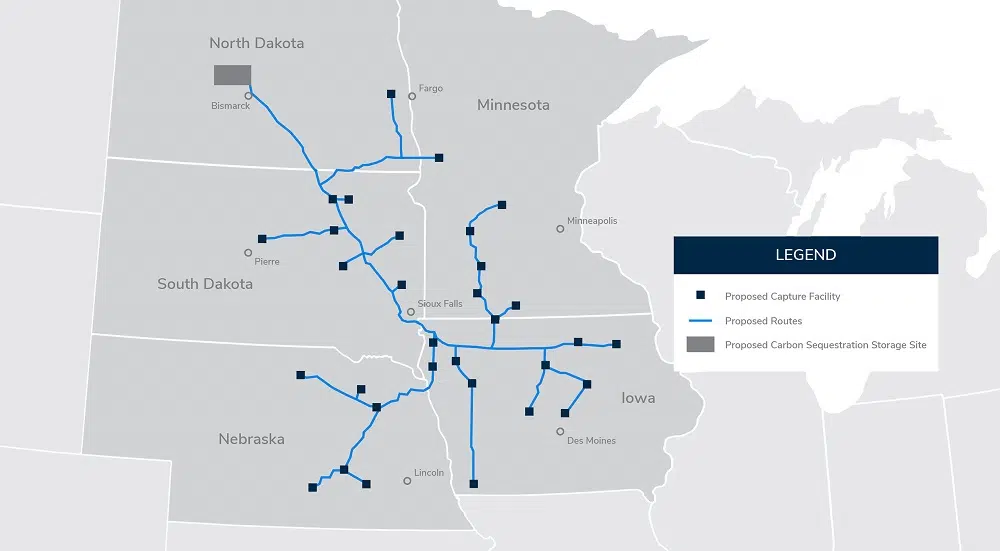
Summit Carbon Solutions pipeline proposed project footprint as of Oct. 5, 2022.
Image credit SCS.
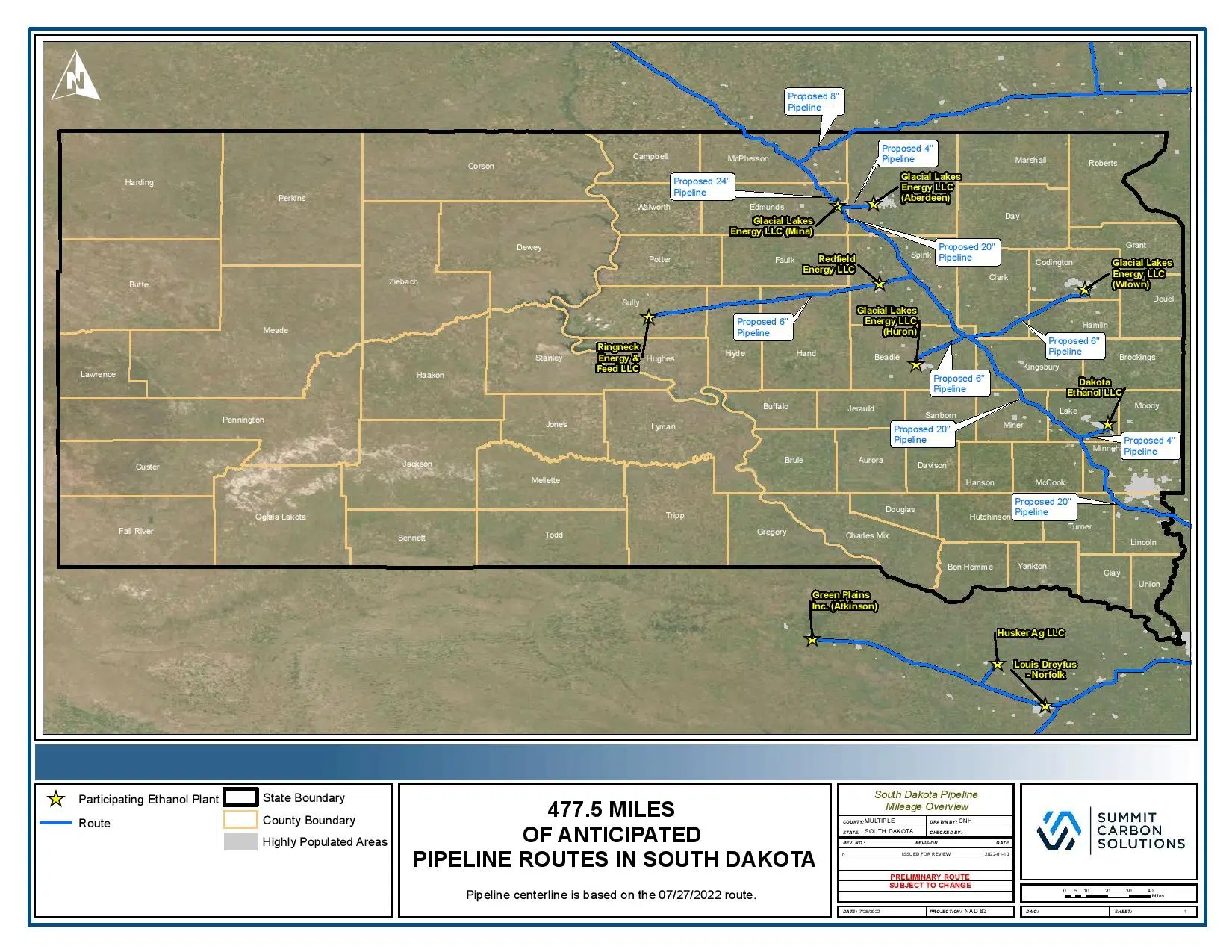
Summit Carbon Solutions pipeline project proposed footprint in South Dakota as of Oct. 5, 2022.
Image credit SCS.









Comments